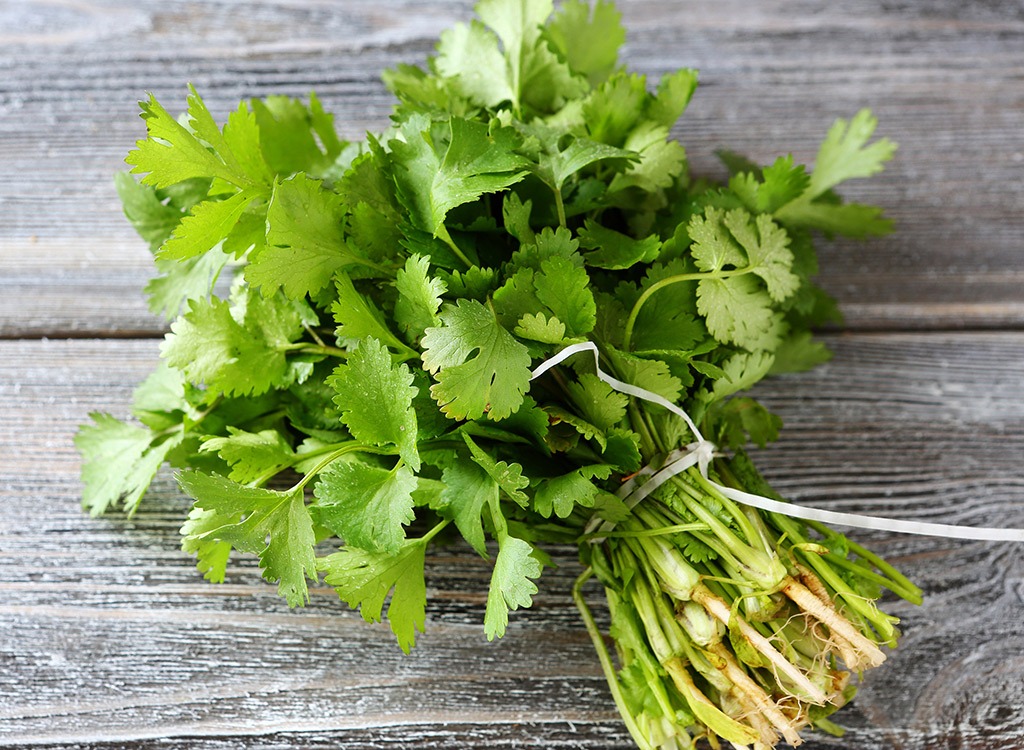The Science Behind Why Some People Can’t Stand Cilantro

Cilantro: It’s the great culinary divider. People either love it or hate it—there is rarely an in-between. The problem, the haters say, is that the herb tastes like soap, or dirt, or a stinkbug. No surprise, then, that they wouldn’t want it anywhere near their dinner plate. So what’s going on, and why do some people find cilantro delicious, while others can’t stand it?
Turns out, it’s genetic. When researchers from the DNA-deciphering site 23andMe compared the genes of pro-cilantro people to anti-cilantro people, they found two variations, also known as single nucleotide polymorphisms (shortened in the science world to SNPs, and aptly pronounced “snips”).
“If your DNA is a book, then the SNP is one letter in a word, and it’s spelled differently from person to person,” says Becca Krock, Ph.D., a 23andMe product scientist. She explains that the SNPs influence how certain proteins get built in an individual’s body. And those proteins affect how that particular body works.
“These SNPs have the instructions to build olfactory proteins that live in your nose and detect scent molecules in the air,” she explains. “So what’s probably happening with cilantro is that, based on genetics, some people have different responses to the food.”
Why does cilantro taste like soap to some people?
As Krock explains, cilantro contains many molecules that contribute to its scent and taste. Some of those molecules are things called aldehydes, and existing research has shown that a set of people perceive aldehydes as having a soapy taste or smell.
“In fact, they are in soap,” Krock points out. But despite knowing all that about aldehydes and SNPs, scientists don’t really know whether the SNPs and subsequent proteins determine how molecules smell to an individual, or if they merely alter how well that individual is able to detect the smell.
“It could be that some people are more or less able to sense the soapiness,” Krock says, referring to the idea of “supertasters,” or people who can detect flavors others can’t.
Is my DNA dictating what salsa I like?
Yes and no. SNPs are not the only genetic factors influencing which cilantro camp a person falls into.
“Our report covers two genetic variants, but they are only a small fraction of all the genetics that are impacting the trait,” Krock says. “Whether you think cilantro tastes soapy is part genetics and part everything else: culture, whether you had it growing up, or other factors we don’t know about. Genetics is one factor.”
Maya Feller, MS, RD, CDN of Maya Feller Nutrition, agrees. “Flavor is a combination of sensory experiences with olfaction,” she says. “Taste preferences are highly individual and are linked to genetic differences in a person’s taste receptors. The end result influences our likes and dislikes.”
But, she continues, genetic differences don’t categorically determine our likes and dislikes. “There are many factors such as cultural food norms, access to foods offered in your area, environment, repeated exposure to certain foods, learned food-related behaviors, energy levels, hormones and emotions that factor into our likes and dislikes around food,” she says.
Feller’s take jibes with what 23andMe researchers found. “It’s more common for people to say they find cilantro soapy than to say that they dislike cilantro,” Krock says. “And those numbers vary based on whether your culture has food that features cilantro heavily. Perceiving the soapiness of cilantro is one thing, and disliking cilantro is a totally different thing.”
Should I try to eat cilantro anyway, for my health?
While the culinary benefits of cilantro are debatable, its health benefits are more widely accepted. Feller notes that the herb has anti-inflammatory and antioxidant properties, and is a good source of iron, magnesium, and manganese.
Jim White, RD, ACSM EX-P, and owner of Jim White Fitness and Nutrition Studios, adds that cilantro provides vitamin A, improves skin and hair health, and increases energy. It also adds to a general decreased risk of obesity, diabetes, and heart disease.
If you want those perks but wish there was an easier way to stomach the soapiness, Feller has a suggestion. “Crushing the leaves before consumption may help to lighten the taste, since the enzymes released will turn the unfavorable taste into something milder,” she says.
A little persistence might pay off, too. “We can learn to enjoy new flavors,” Feller says. “Just as research tells us that children need as many as 20 exposures before accepting a new food, the same may hold true for adults.”
But if you’re a hardcore cilantro hater and don’t see yourself coming around to the taste anytime soon, don’t fret. Both nutritionists have good news.
“You can reap similar benefits from herbs like clove, oregano, rosemary, parsley, and basil,” says Feller. And White adds that you can get your vitamin A from foods like sweet potatoes, kale, carrots, and mangos. And you can get an energy boost from bananas, eggs, or quinoa. If you really don’t like cilantro, no one’s forcing you to eat it. But if you do like the herb’s taste, it has plenty of benefits.